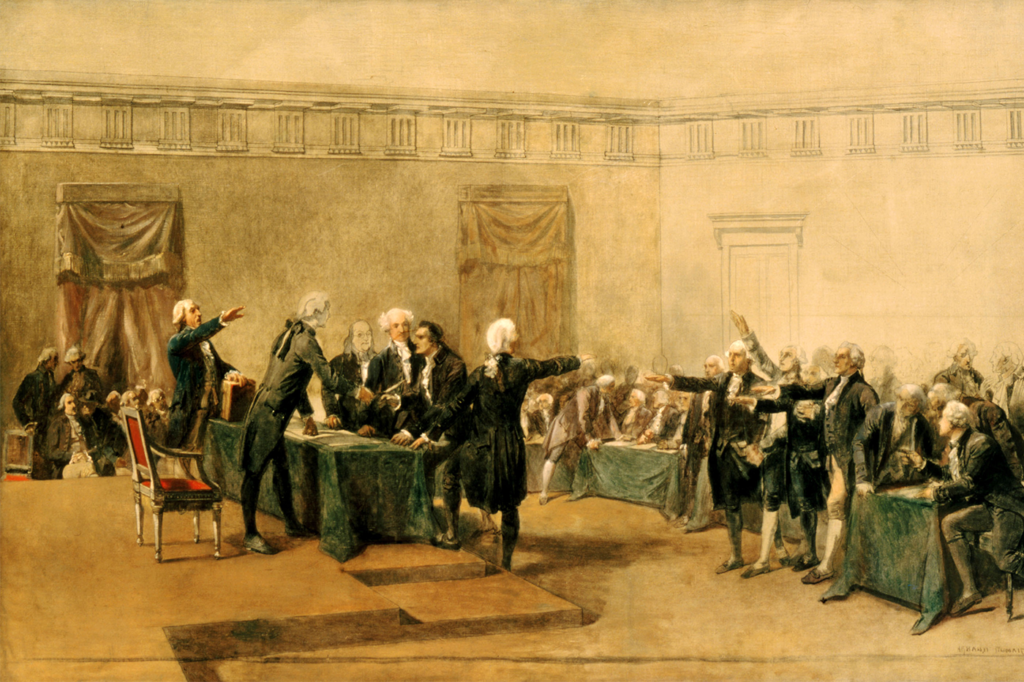This essay is part of our series on Race and Racism in America. See the full collection here.
Much of the criticism heaped upon the New York Times’ 1619 Project has stemmed from its avowed intention to “reframe the country’s history.” In particular, the project aims to relocate the date of the American Founding from the current consensus—either 1776 or 1787—to 1619, the year when the first enslaved Africans arrived in the British colony of Virginia.
Many conservatives have interpreted this attempted relocation as attempted larceny. They see it as just another in a long line of efforts to snatch the late eighteenth-century American Founding from its hallowed place at the center of American identity. Yet this interpretation of the 1619 Project is both oversimplified and uncharitable. Most importantly, it fails to recognize the potential in the project’s aims to further the goal of redemption from America’s original sin of slavery.
Seeing the 1619 Project as complementary to the 1776 Project opens the prospect of a new project to which both essentially contribute. It may even be able to unite liberals and conservatives around a shared narrative of American identity and history.
Start your day with Public Discourse
Sign up and get our daily essays sent straight to your inbox.The Need for Nuance and Charity
Most of the conservative commentaries on the 1619 Project have reflected the polarized nature of contemporary public discourse. Trapped in the small boxes imposed on us by the distorted virtual reality of internet media, these commentators immediately rejected the 1619 Project as a product of the other side. Because the project aims to reframe American history around 1619 as our founding date, and because other projects and commentaries that attempt to reorient American history around the significant evil of slavery rather than the aspirations of the Declaration of Independence tend to reject the latter as hopelessly tainted, too many have rushed to view the 1619 Project as just another destructive revisionist history.
Although there certainly are moments in some of the 1619 Project articles that support this easy categorization, the most prominent signposts point elsewhere. The introductory summary, for example, speaks of “reframe[ing] the country’s history, understanding 1619 as our true founding”—so far, so revisionist—but then goes on to speak of placing not only the “consequences of slavery” but also “the contributions of black Americans” at the center of our American story. The latter is a highly significant and suggestive point, entirely missed by existing critical commentaries. The project doesn’t intend to stop at uncovering the “consequences of slavery,” as these commentaries imply, but rather intends to showcase the positive “contributions of black Americans” to American identity and history.
There is, in other words, a positive side to the project that is announced in its very introduction. It is not intended to be merely destructive, but constructive. And the contributions that black people have made to this constructive project is, moreover, not stated as merely corrective or externally imposed. These are not the contributions of blacks to America—as I’m inclined to think many conservative commentators instinctively interpreted this phrase—but rather the contributions of black Americans. In other words, these are the contributions that black Americans have made from within an American nation given its fundamental and aspirational form in the Declaration of Independence, and its institutional design from the Constitution.
Nikole Hannah-Jones’s lead article in the project deserves a similarly nuanced interpretation. Its title begins by sounding an apparently straightforward revisionist, critical note: “Our democracy’s founding ideals were false when they were written.” Leaving aside the important distinction she elides here between a democracy and a republic, this again seems to fall squarely on the anti-eighteenth-century-founding side of the well-worn debate. But then the second sentence rules out this easy categorization: “Black Americans have fought to make them true.” What is the them that black Americans have fought to make true? Our democracy’s founding ideals. Not, in other words, some cosmopolitan idea of human rights, or some groundless utopia of social justice, but the very principles of 1776.
The 1619 Project frames itself, at times, as a zero-sum alternative to the 1776 Project. It does so largely out of the journalistic necessity of appealing to readers who do not want to be forced to leave their comfortable boxes of thought and discourse. But the 1619 Project aims to be more than this; it aims to bring black American voices and perspectives into the American story. Many of us don’t have difficulty identifying with this story. To disparage those who do in their admirable effort to share in the American story is as uncharitable as it is unwise.
The 3395 Project
The 1619 Project really points us to the need for the 3395 Project—the project of constructing a new and stronger American identity that incorporates both the experiences, perspectives, and distinctive contributions of the descendants of enslaved Africans (1619) and also the aspirations and ideals enunciated by European Americans in the Declaration of Independence (1776). Both of these, together, constitute the core of what makes America exceptional.
I am supported in this opinion by many luminaries whose wisdom is recognized by conservative commentators. These include, for example, Alexis de Tocqueville and Frederick Douglass. In his often overlooked chapter on “the three races” in Democracy in America, Tocqueville provides the following remarkable statement:
The Americans are, of all modern peoples, those who have pushed equality and inequality furthest among men. They have combined universal suffrage and servitude. They seem to have wanted to prove in this way the advantages of equality by opposite arguments. It is claimed that the Americans, by establishing universal suffrage and the dogma of sovereignty of the people, have made clear to the world the advantages of equality. As for me, I think that they have above all proved this by establishing servitude, and I find that they establish the advantages of equality much less by democracy than by slavery.
Tocqueville’s argument here—and in this chapter generally—is not far from that of the 1619 Project: the abstract principles of liberty and equality define American exceptionalism not merely by themselves, but even more so in the sharpness of their contrast with the practical reality of slavery. The political principles of 1776 are uniquely American. So too is the rigid, extensive, and pervasive system of race-based, black vs. white chattel slavery that accompanied them.
Frederick Douglass, in his speech on the Dred Scott decision, makes a similar point. He claims that “The American people have been called upon, in a most striking manner, to abolish and put away forever the system of slavery.”
Why would Douglass think the American people had been called upon by Divine Providence to abolish slavery? The principles of 1776. Why would Douglass think the American people have been called upon not only to abolish American slavery here and now, but “to abolish and put away forever the system of slavery?” Because American slavery was in fact paradigmatic in many important ways. The defeat of this exceptionally embedded, extensive, race-based slave system at the hands of the exceptionally true and important principles of natural rights and natural law-based liberty and equality would be so powerful that no one could ever defend slavery as Chief Justice Taney had again.
This is why it is so important that we see the 1619 Project as part of the 3395 Project.
All of the American Founders—including 1776’s Thomas Jefferson and 1787’s James Madison—readily admitted the impossibility (in their minds) of ever constructing an American society free of the consequences of race-based slavery. Tocqueville emphasized precisely the same point. And acknowledging the “contributions of black Americans” to American identity and history should come easily to anyone who genuinely understands and cares about the meaning and importance of being an American.
I believe many of the 1619 Project authors would welcome the addition of 1776. I hope that the devotees of 1776 might be persuaded to make the reciprocal addition.













